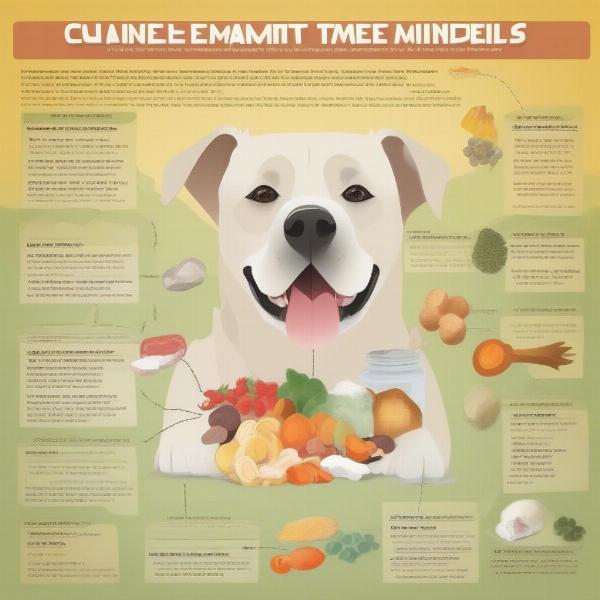Ensuring your canine companion receives optimal nutrition is a cornerstone of responsible dog ownership. While a complete and balanced diet is the foundation, vitamin and mineral supplements for dogs can play a crucial role in supporting their overall health and well-being. This guide delves into the world of canine supplements, addressing common questions and providing practical advice for dog owners of all experience levels.
A balanced diet should provide most of the necessary vitamins and minerals for a healthy dog. However, certain situations like growth stages, pregnancy, illness, or specific dietary needs may warrant supplementation. Choosing the right vitamin and mineral supplement for dogs can be overwhelming with the sheer variety available. This guide will help you navigate the options and make informed decisions for your furry friend.
Understanding the Need for Vitamin and Mineral Supplements
While commercial dog foods are formulated to be nutritionally complete, individual dogs can have varying needs. Certain medical conditions, life stages, or even dietary sensitivities can create gaps in their nutritional intake. Supplementation can bridge these gaps and support optimal health.
When are Supplements Necessary?
Supplements are not always necessary, but they can be beneficial in certain situations:
- Growing puppies: Rapid growth requires increased nutrient intake.
- Pregnant or lactating dogs: Supporting the mother and her puppies requires additional nutritional support.
- Senior dogs: Age-related changes can affect nutrient absorption and utilization.
- Dogs with specific health conditions: Certain medical conditions may necessitate targeted supplementation.
- Picky eaters or dogs with limited diets: Supplements can ensure these dogs receive all necessary nutrients.
Choosing the Right Supplement
The pet supplement market offers a vast array of options. Selecting the appropriate vitamin and mineral supplement for dogs requires careful consideration.
Key Nutrients to Look For:
Essential vitamins and minerals include vitamins A, C, D, E, and K, as well as B vitamins. Essential minerals include calcium, phosphorus, potassium, magnesium, iron, zinc, copper, and iodine. Look for supplements that provide a balanced combination of these nutrients.
 Choosing the Right Dog Supplement
Choosing the Right Dog Supplement
Types of Supplements:
- Multivitamins: Provide a broad spectrum of essential nutrients.
- Mineral supplements: Address specific mineral deficiencies.
- Targeted supplements: Designed to support specific health functions, such as joint health or skin and coat health.
- Chews, tablets, powders, or liquids: Choose a form that is palatable and easy to administer to your dog.
Safety and Dosage
Always consult your veterinarian before starting your dog on any new supplement. They can assess your dog’s individual needs and recommend appropriate products and dosages. Never exceed the recommended dosage, as excessive intake of certain vitamins or minerals can be harmful.
Potential Risks of Over-Supplementation:
Over-supplementation can lead to toxicity, particularly with fat-soluble vitamins like A, D, E, and K. Symptoms of toxicity can vary depending on the nutrient involved, but can include vomiting, diarrhea, loss of appetite, and even more serious health problems.
Working with Your Veterinarian
Your veterinarian is your best resource for determining if your dog needs supplements. They can conduct blood tests to assess nutrient levels and recommend appropriate products and dosages based on your dog’s individual health profile.
Conclusion
Vitamin and mineral supplements for dogs can be a valuable addition to a balanced diet, supporting overall health and well-being. However, it’s crucial to consult with your veterinarian before starting any new supplement regimen to ensure safety and efficacy. By working together, you can provide your furry companion with the optimal nutrition they need to thrive.
FAQ
- Do all dogs need vitamin and mineral supplements? No, not all dogs require supplements. A complete and balanced diet should provide most necessary nutrients.
- Can I give my dog human vitamins? No, human vitamins are formulated for human needs and can be toxic to dogs.
- What are the signs of a vitamin or mineral deficiency in dogs? Signs can vary but may include poor coat condition, skin issues, lethargy, or digestive problems.
- How do I choose a reputable supplement brand? Look for brands that follow good manufacturing practices and have undergone third-party testing.
- What should I do if my dog experiences side effects from a supplement? Discontinue use immediately and contact your veterinarian.
- Can supplements replace a balanced diet? No, supplements should complement, not replace, a healthy diet.
- Are there any specific supplements for senior dogs? Yes, supplements targeting joint health, cognitive function, and immune support are often beneficial for older dogs.
Related Articles
About ILM Dog
ILM Dog is your trusted international resource for comprehensive dog care information, covering everything from breed selection and puppy care to senior dog health and specialized diets. We provide expert guidance on nutrition, training, and overall well-being, empowering dog owners worldwide with the knowledge and resources they need to provide the best possible care for their canine companions. For expert advice or to learn more about our services, including hempseed for dogs and liver paste dog, contact us via email at [email protected] or call us at +44 20-3965-8624.